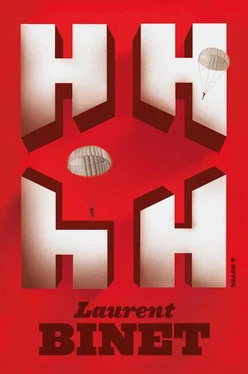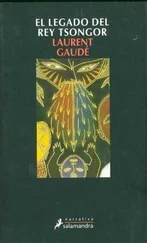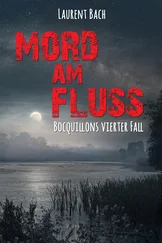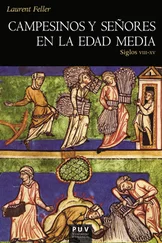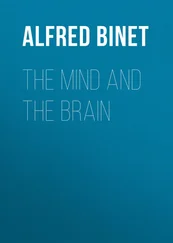Himmler asks the doctors for explanations. The patient seemed to be recovering well until he was laid low by a sudden infection. Perhaps the bomb contained poison or the horsehairs from the Mercedes’s seats got into his spleen. There are various theories, but nobody knows which one is correct. But if, as they believe, this is the beginning of septicemia, the infection is going to spread very quickly and he will be dead within forty-eight hours. To save Heydrich, they would need something that is not to be found anywhere in the vast territory of the Reich: penicillin. And the British aren’t about to give them any.
On June 3, the Libuse radio receives the following message, for the attention of Anthropoid:
From the president. I am very happy that you have been able to keep in contact. I thank you most sincerely, and take note of your absolute determination, and that of your friends. This shows me that the whole nation is united. I can assure you that this will bear fruit. The events in Prague had a huge impact here and have done a great deal for international recognition of the Czech Resistance.
But Beneš doesn’t know that the best is yet to come. And the worst.
Anna Maruscakova, a young and pretty factory worker, called in sick today. So when the afternoon post arrived and the factory boss found a letter addressed to her, he opened and read it without a second thought. The letter was from a young man, and this is what it said:
Dear Ania,
Sorry for taking so long to write to you, but I hope you will understand, because you know I have many worries. What I wanted to do—I’ve done it. On the fatal day, I slept in Cabarna. I’m fine. I’ll come to see you this week, and afterward we will never see each other again.
Milan
The factory boss is a Nazi sympathizer—or perhaps not even that: just an ordinary person conditioned by that ignoble mentality that exists almost everywhere but which finds its true voice in occupied countries. Deciding that there is perhaps something fishy going on, he forwards the letter to the relevant authority. The Gestapo’s inquiry has stalled so badly that they are desperate for a new bone to chew. They treat the dossier with a diligence all the greater because after making more than three thousand arrests they still haven’t found anything useful. Very quickly, they determine that the letter concerns a love affair: the author is a married man. He probably wishes to put an end to an adulterous relationship. The details of the story are not very clear, but it’s true that certain phrases could be construed as ambiguous. Perhaps this young man even wanted, between the lines, to suggest an imaginary involvement in the Resistance—either to impress his mistress, or to create an atmosphere of mystery so he could break up with her without having to justify himself. Whatever the truth of this, he had nothing to do in any shape or form with Gabčík, Kubiš, and their friends. They’ve never heard of him and he’s never heard of them. But the Gestapo is so desperate for leads that they decide to dig deeper on this one. And this leads them to Lidice.
Lidice is a peaceful and picturesque little village. It is also the birthplace of two Czechs who enrolled in the RAF. This is all the Germans have discovered in the course of their inquiry. Even to them, it is obviously a false trail. But Nazi logic is complex and mysterious. Either that or it’s very simple: they’re out for blood and their patience is running thin.
I spend a long time looking at Anna’s photo. The poor girl is posed as if for a Hollywood glamour shot, even though it’s just an identity photo for her work permit. The more I examine this portrait, the more beautiful I find her. She looks a bit like Natacha: high forehead, well-drawn mouth, with that same look in her eyes of gentleness and love, slightly darkened, perhaps, by a premonition of disappointment.
“Gentlemen, if you’ll follow me…” Frank and Dalüge give a start. The corridor is perfectly silent as they walk its mazelike turns for I don’t know how long. Holding their breath, they enter the hospital room. The silence here is even more overpowering. Lina is there, hieratic and pale. They approach the bed stealthily, as if fearful of waking a wildcat or a snake. But Heydrich’s face remains impassive. In the hospital they write down the time of his death—4:30 a.m.—and the cause: infection caused by a wound.
Opportunity makes not only the thief but the assassin too. Therefore, supposedly heroic behavior such as driving around in an open-topped, unarmored car or walking the streets without a bodyguard are nothing but damned stupidity, and are against the national interest. That a man as irreplaceable as Heydrich should expose himself to danger in that way… it’s idiotic and stupid! Men as important as Heydrich should always know that they are like targets at a fairground, and that a certain number of people are constantly watching for any opportunity to shoot them.
Goebbels is listening to something he will hear more and more often until April 30, 1945: Hitler, adopting a sententious tone and lecturing the world, in a vain attempt to keep his temper. Next to him, Himmler listens in approving silence. He is not in the habit of contradicting the Führer anyway, but he, too, is angry—with the Czechs and with Heydrich. Naturally, Himmler was wary of the ambitions of his right-hand man. But without him—deprived of the abilities of this machine of terror and death—Himmler feels more vulnerable. To lose Heydrich is to lose a potential rival, but above all a trump card. Heydrich was his jack of clubs. And everyone knows the story: once Lancelot left the kingdom of Logres, that was the beginning of the end.
For the third time, Heydrich makes a solemn journey to the castle of Hradčany. But this time he is in a coffin. A Wagnerian setting has been organized for the occasion. The coffin, wrapped in a huge SS standard, is carried on a gun carriage. A torchlit procession leaves from the hospital, an endless line of military vehicles moving slowly through the night. Armed Waffen-SS guards march alongside, brandishing torches, which illuminate the route. Throughout its journey the convoy is saluted by soldiers standing to attention at the sides of the road. No civilians have been authorized to attend, but in truth nobody would want to risk going outside tonight anyway. Among the guard of honor, accompanying the coffin on foot, are Frank, Dalüge, Böhme, and Nebe, all wearing helmets and combat uniform. And so, after a journey that began at 10:00 a.m. on May 27, Heydrich finally reaches his destination. For the last time, he passes through the open gates and enters the walls of the castle of the kings of Bohemia.
I’d like to spend my days with the parachutists in the crypt, reporting their discussions, describing how they live from hour to hour in the cold and the damp, what they eat, what they read, what rumors they hear from the town, what they do with their girlfriends when they visit. I would like to tell you about their plans, their doubts, their hopes, their fears, their dreams and thoughts. But that isn’t possible, because I know almost nothing about any of it. I don’t even know how they reacted when they heard about Heydrich’s death, although that ought to make one of the best bits of my book. I know the parachutists were so cold in the crypt that, when night fell, some of them took their mattresses to the gallery that overhung the nave because it was slightly warmer. That’s not much, is it? I also know that Valčík had a fever (probably as a result of his injury), and that Kubiš was one of those who tried sleeping in the church rather than the crypt. Or that he tried it at least once.
Читать дальше
